Report: South Bank Field Trip Analysis and Findings
VerifiedAdded on 2020/01/15
|9
|2310
|425
Report
AI Summary
This report presents the findings of a field trip to South Bank, Brisbane, exploring sustainability management issues within the tourism sector. The report identifies key challenges, including false marketing practices by local businesses and a lack of diverse employment opportunities, impacting the local economy. It recommends inventorying existing opportunities, providing better employment prospects, and improving marketing strategies to attract tourists. The report also emphasizes the importance of ethical marketing and promoting locally-made products. The field trip experience provided insights into data collection, communication, and the realities of tourism management, highlighting the need for stakeholders to address these issues to ensure the long-term sustainability of South Bank as a premier tourist destination. The report concludes that sustainability practices are crucial for the success of any tourist destination, and recommends corrective measures regarding marketing and employment.
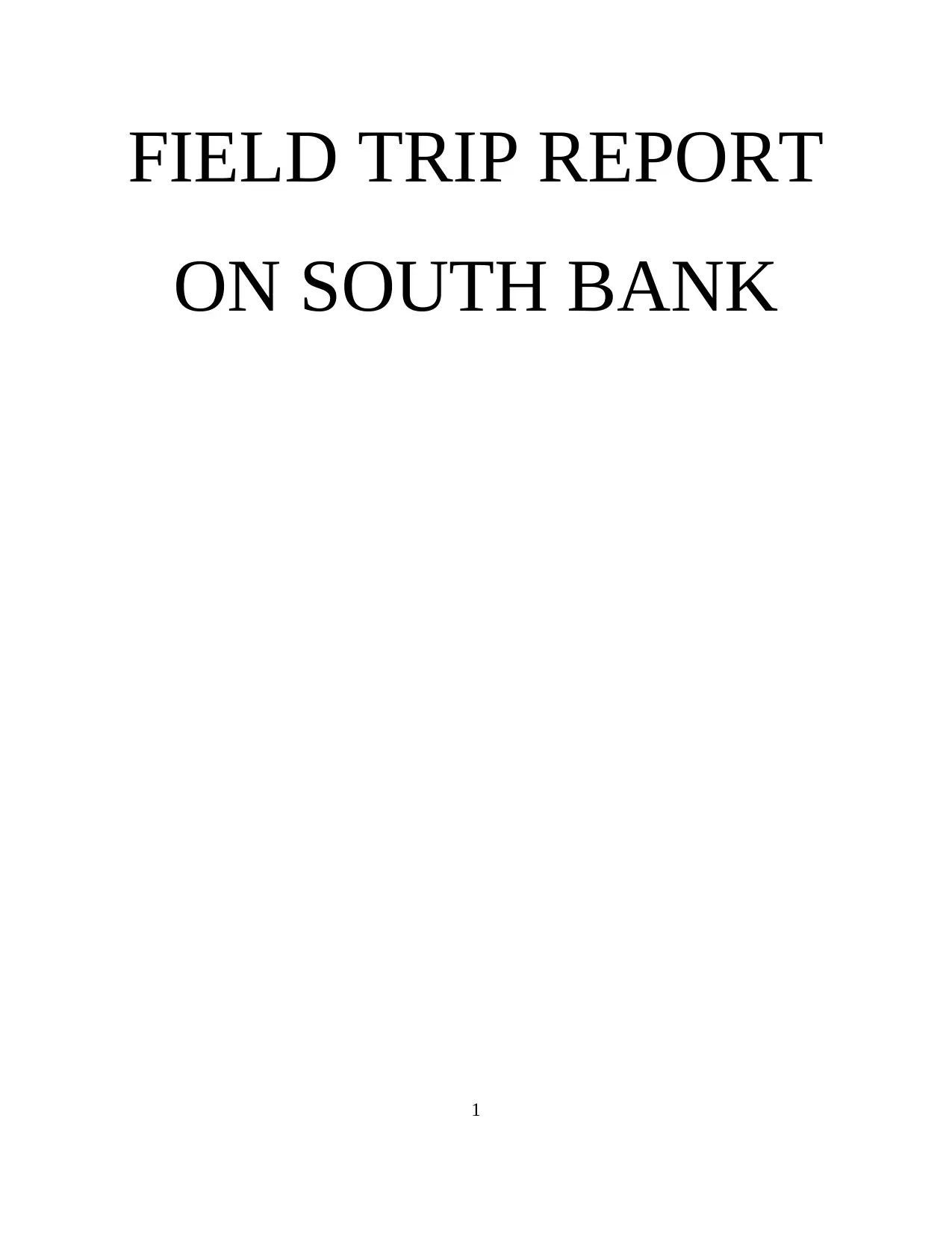
FIELD TRIP REPORT
ON SOUTH BANK
1
ON SOUTH BANK
1
Paraphrase This Document
Need a fresh take? Get an instant paraphrase of this document with our AI Paraphraser
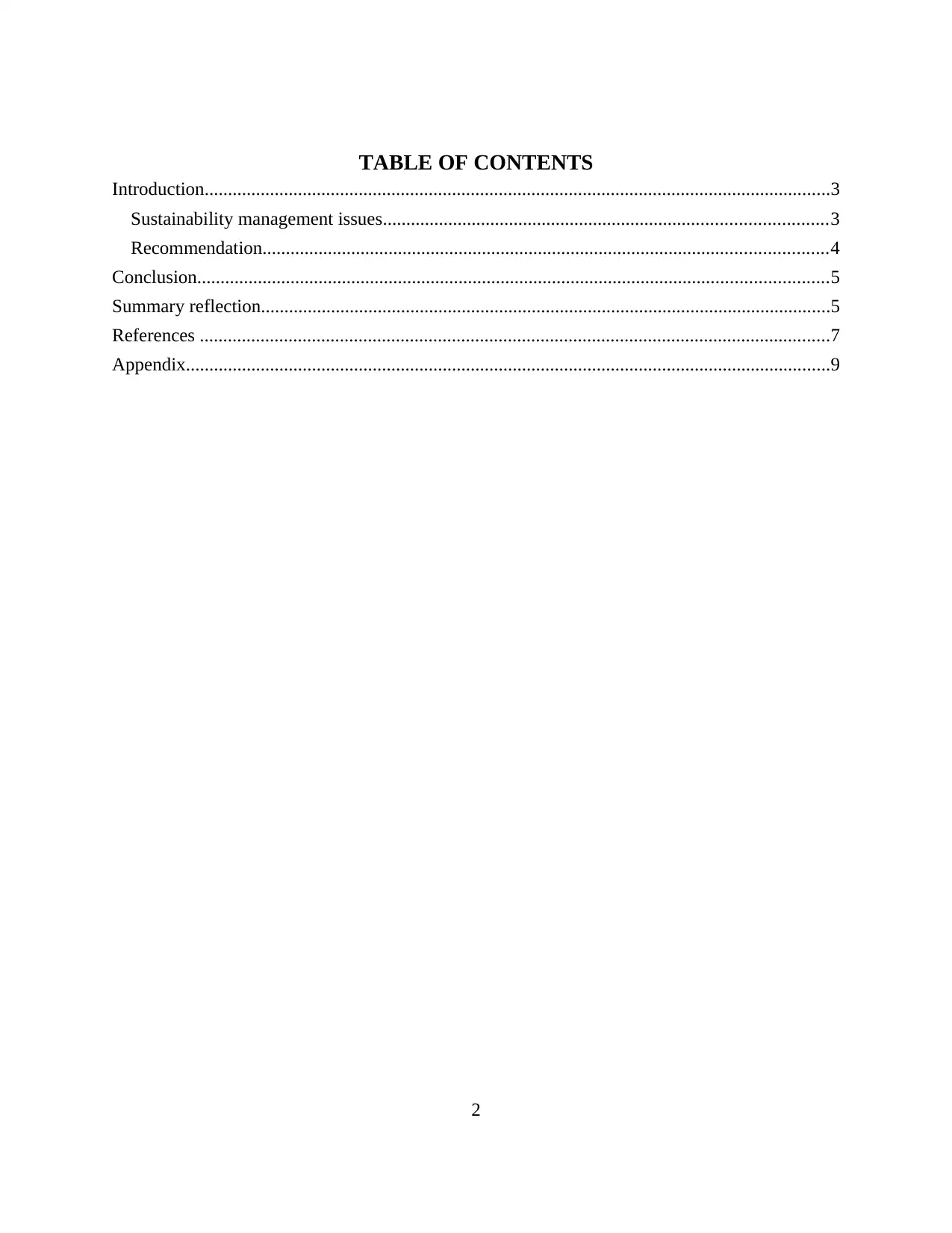
TABLE OF CONTENTS
Introduction......................................................................................................................................3
Sustainability management issues...............................................................................................3
Recommendation.........................................................................................................................4
Conclusion.......................................................................................................................................5
Summary reflection..........................................................................................................................5
References .......................................................................................................................................7
Appendix..........................................................................................................................................9
2
Introduction......................................................................................................................................3
Sustainability management issues...............................................................................................3
Recommendation.........................................................................................................................4
Conclusion.......................................................................................................................................5
Summary reflection..........................................................................................................................5
References .......................................................................................................................................7
Appendix..........................................................................................................................................9
2
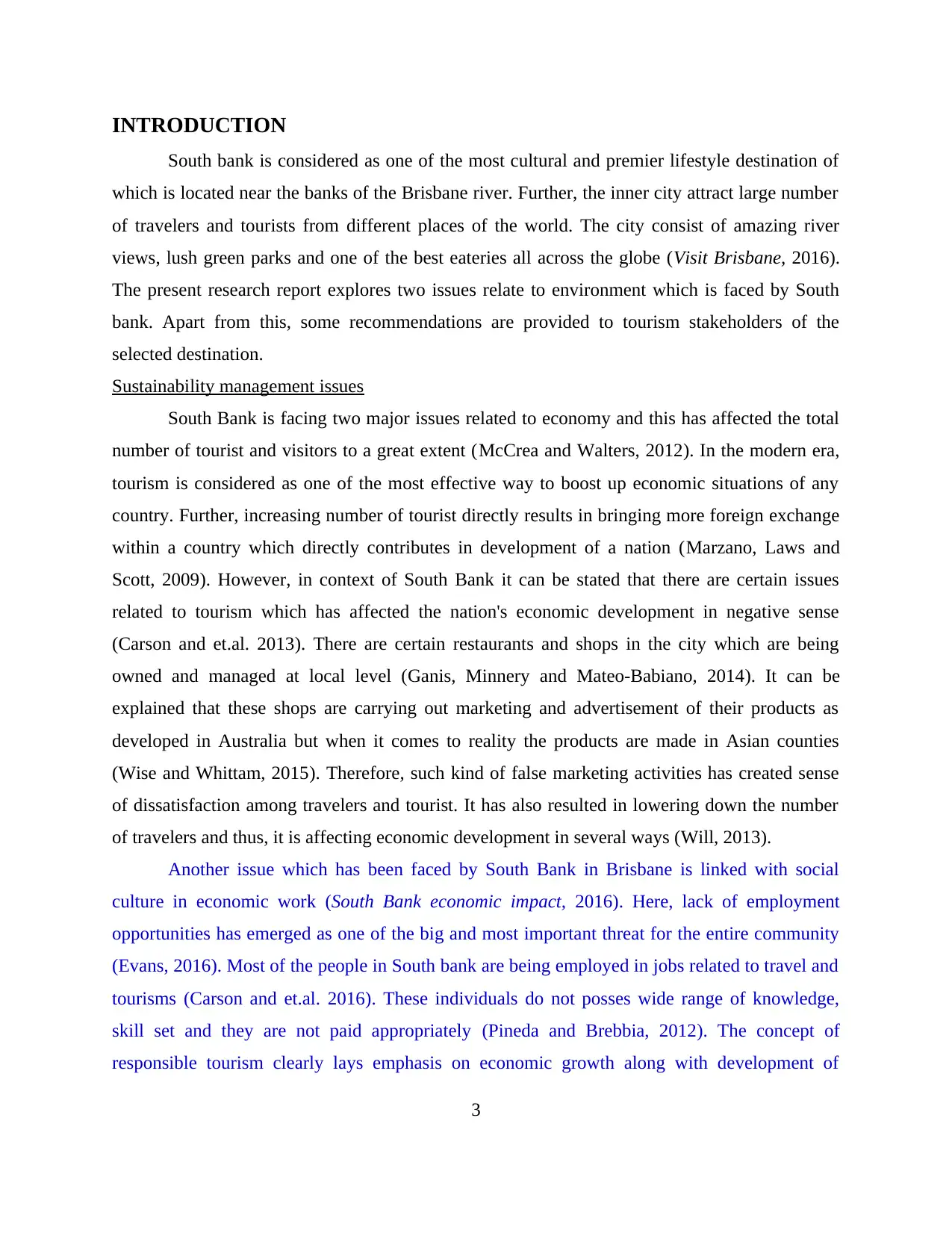
INTRODUCTION
South bank is considered as one of the most cultural and premier lifestyle destination of
which is located near the banks of the Brisbane river. Further, the inner city attract large number
of travelers and tourists from different places of the world. The city consist of amazing river
views, lush green parks and one of the best eateries all across the globe (Visit Brisbane, 2016).
The present research report explores two issues relate to environment which is faced by South
bank. Apart from this, some recommendations are provided to tourism stakeholders of the
selected destination.
Sustainability management issues
South Bank is facing two major issues related to economy and this has affected the total
number of tourist and visitors to a great extent (McCrea and Walters, 2012). In the modern era,
tourism is considered as one of the most effective way to boost up economic situations of any
country. Further, increasing number of tourist directly results in bringing more foreign exchange
within a country which directly contributes in development of a nation (Marzano, Laws and
Scott, 2009). However, in context of South Bank it can be stated that there are certain issues
related to tourism which has affected the nation's economic development in negative sense
(Carson and et.al. 2013). There are certain restaurants and shops in the city which are being
owned and managed at local level (Ganis, Minnery and Mateo-Babiano, 2014). It can be
explained that these shops are carrying out marketing and advertisement of their products as
developed in Australia but when it comes to reality the products are made in Asian counties
(Wise and Whittam, 2015). Therefore, such kind of false marketing activities has created sense
of dissatisfaction among travelers and tourist. It has also resulted in lowering down the number
of travelers and thus, it is affecting economic development in several ways (Will, 2013).
Another issue which has been faced by South Bank in Brisbane is linked with social
culture in economic work (South Bank economic impact, 2016). Here, lack of employment
opportunities has emerged as one of the big and most important threat for the entire community
(Evans, 2016). Most of the people in South bank are being employed in jobs related to travel and
tourisms (Carson and et.al. 2016). These individuals do not posses wide range of knowledge,
skill set and they are not paid appropriately (Pineda and Brebbia, 2012). The concept of
responsible tourism clearly lays emphasis on economic growth along with development of
3
South bank is considered as one of the most cultural and premier lifestyle destination of
which is located near the banks of the Brisbane river. Further, the inner city attract large number
of travelers and tourists from different places of the world. The city consist of amazing river
views, lush green parks and one of the best eateries all across the globe (Visit Brisbane, 2016).
The present research report explores two issues relate to environment which is faced by South
bank. Apart from this, some recommendations are provided to tourism stakeholders of the
selected destination.
Sustainability management issues
South Bank is facing two major issues related to economy and this has affected the total
number of tourist and visitors to a great extent (McCrea and Walters, 2012). In the modern era,
tourism is considered as one of the most effective way to boost up economic situations of any
country. Further, increasing number of tourist directly results in bringing more foreign exchange
within a country which directly contributes in development of a nation (Marzano, Laws and
Scott, 2009). However, in context of South Bank it can be stated that there are certain issues
related to tourism which has affected the nation's economic development in negative sense
(Carson and et.al. 2013). There are certain restaurants and shops in the city which are being
owned and managed at local level (Ganis, Minnery and Mateo-Babiano, 2014). It can be
explained that these shops are carrying out marketing and advertisement of their products as
developed in Australia but when it comes to reality the products are made in Asian counties
(Wise and Whittam, 2015). Therefore, such kind of false marketing activities has created sense
of dissatisfaction among travelers and tourist. It has also resulted in lowering down the number
of travelers and thus, it is affecting economic development in several ways (Will, 2013).
Another issue which has been faced by South Bank in Brisbane is linked with social
culture in economic work (South Bank economic impact, 2016). Here, lack of employment
opportunities has emerged as one of the big and most important threat for the entire community
(Evans, 2016). Most of the people in South bank are being employed in jobs related to travel and
tourisms (Carson and et.al. 2016). These individuals do not posses wide range of knowledge,
skill set and they are not paid appropriately (Pineda and Brebbia, 2012). The concept of
responsible tourism clearly lays emphasis on economic growth along with development of
3
⊘ This is a preview!⊘
Do you want full access?
Subscribe today to unlock all pages.

Trusted by 1+ million students worldwide
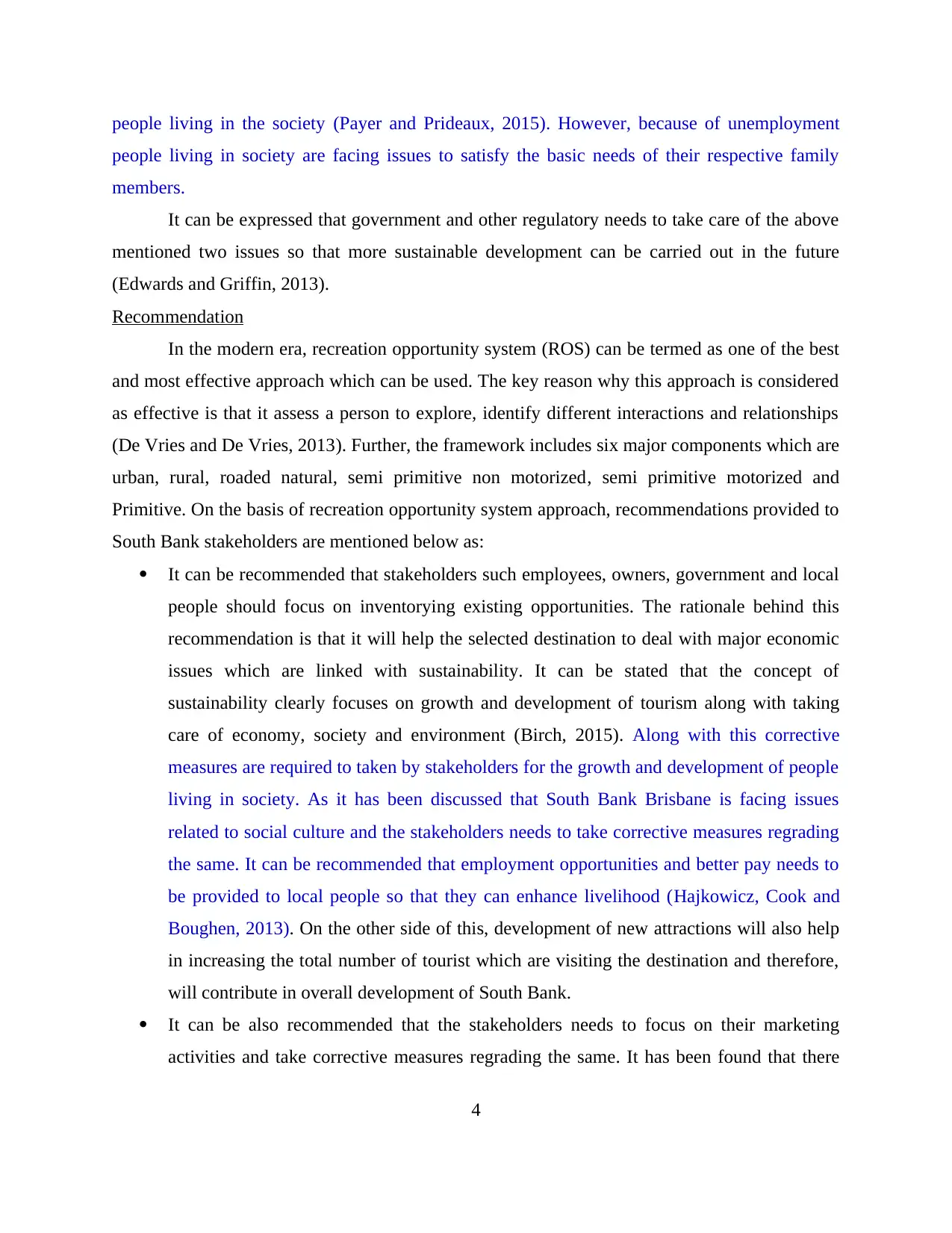
people living in the society (Payer and Prideaux, 2015). However, because of unemployment
people living in society are facing issues to satisfy the basic needs of their respective family
members.
It can be expressed that government and other regulatory needs to take care of the above
mentioned two issues so that more sustainable development can be carried out in the future
(Edwards and Griffin, 2013).
Recommendation
In the modern era, recreation opportunity system (ROS) can be termed as one of the best
and most effective approach which can be used. The key reason why this approach is considered
as effective is that it assess a person to explore, identify different interactions and relationships
(De Vries and De Vries, 2013). Further, the framework includes six major components which are
urban, rural, roaded natural, semi primitive non motorized, semi primitive motorized and
Primitive. On the basis of recreation opportunity system approach, recommendations provided to
South Bank stakeholders are mentioned below as:
It can be recommended that stakeholders such employees, owners, government and local
people should focus on inventorying existing opportunities. The rationale behind this
recommendation is that it will help the selected destination to deal with major economic
issues which are linked with sustainability. It can be stated that the concept of
sustainability clearly focuses on growth and development of tourism along with taking
care of economy, society and environment (Birch, 2015). Along with this corrective
measures are required to taken by stakeholders for the growth and development of people
living in society. As it has been discussed that South Bank Brisbane is facing issues
related to social culture and the stakeholders needs to take corrective measures regrading
the same. It can be recommended that employment opportunities and better pay needs to
be provided to local people so that they can enhance livelihood (Hajkowicz, Cook and
Boughen, 2013). On the other side of this, development of new attractions will also help
in increasing the total number of tourist which are visiting the destination and therefore,
will contribute in overall development of South Bank.
It can be also recommended that the stakeholders needs to focus on their marketing
activities and take corrective measures regrading the same. It has been found that there
4
people living in society are facing issues to satisfy the basic needs of their respective family
members.
It can be expressed that government and other regulatory needs to take care of the above
mentioned two issues so that more sustainable development can be carried out in the future
(Edwards and Griffin, 2013).
Recommendation
In the modern era, recreation opportunity system (ROS) can be termed as one of the best
and most effective approach which can be used. The key reason why this approach is considered
as effective is that it assess a person to explore, identify different interactions and relationships
(De Vries and De Vries, 2013). Further, the framework includes six major components which are
urban, rural, roaded natural, semi primitive non motorized, semi primitive motorized and
Primitive. On the basis of recreation opportunity system approach, recommendations provided to
South Bank stakeholders are mentioned below as:
It can be recommended that stakeholders such employees, owners, government and local
people should focus on inventorying existing opportunities. The rationale behind this
recommendation is that it will help the selected destination to deal with major economic
issues which are linked with sustainability. It can be stated that the concept of
sustainability clearly focuses on growth and development of tourism along with taking
care of economy, society and environment (Birch, 2015). Along with this corrective
measures are required to taken by stakeholders for the growth and development of people
living in society. As it has been discussed that South Bank Brisbane is facing issues
related to social culture and the stakeholders needs to take corrective measures regrading
the same. It can be recommended that employment opportunities and better pay needs to
be provided to local people so that they can enhance livelihood (Hajkowicz, Cook and
Boughen, 2013). On the other side of this, development of new attractions will also help
in increasing the total number of tourist which are visiting the destination and therefore,
will contribute in overall development of South Bank.
It can be also recommended that the stakeholders needs to focus on their marketing
activities and take corrective measures regrading the same. It has been found that there
4
Paraphrase This Document
Need a fresh take? Get an instant paraphrase of this document with our AI Paraphraser
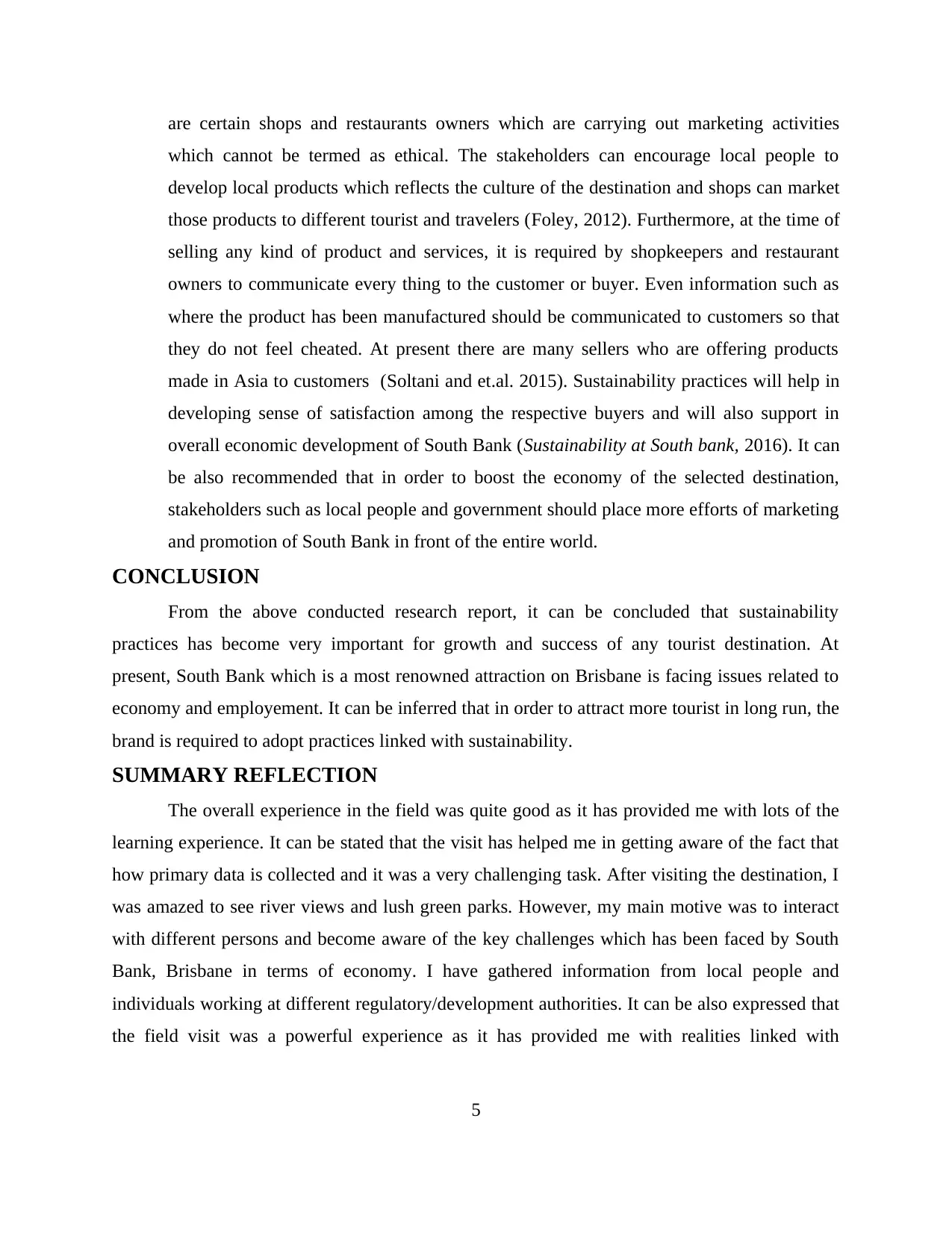
are certain shops and restaurants owners which are carrying out marketing activities
which cannot be termed as ethical. The stakeholders can encourage local people to
develop local products which reflects the culture of the destination and shops can market
those products to different tourist and travelers (Foley, 2012). Furthermore, at the time of
selling any kind of product and services, it is required by shopkeepers and restaurant
owners to communicate every thing to the customer or buyer. Even information such as
where the product has been manufactured should be communicated to customers so that
they do not feel cheated. At present there are many sellers who are offering products
made in Asia to customers (Soltani and et.al. 2015). Sustainability practices will help in
developing sense of satisfaction among the respective buyers and will also support in
overall economic development of South Bank (Sustainability at South bank, 2016). It can
be also recommended that in order to boost the economy of the selected destination,
stakeholders such as local people and government should place more efforts of marketing
and promotion of South Bank in front of the entire world.
CONCLUSION
From the above conducted research report, it can be concluded that sustainability
practices has become very important for growth and success of any tourist destination. At
present, South Bank which is a most renowned attraction on Brisbane is facing issues related to
economy and employement. It can be inferred that in order to attract more tourist in long run, the
brand is required to adopt practices linked with sustainability.
SUMMARY REFLECTION
The overall experience in the field was quite good as it has provided me with lots of the
learning experience. It can be stated that the visit has helped me in getting aware of the fact that
how primary data is collected and it was a very challenging task. After visiting the destination, I
was amazed to see river views and lush green parks. However, my main motive was to interact
with different persons and become aware of the key challenges which has been faced by South
Bank, Brisbane in terms of economy. I have gathered information from local people and
individuals working at different regulatory/development authorities. It can be also expressed that
the field visit was a powerful experience as it has provided me with realities linked with
5
which cannot be termed as ethical. The stakeholders can encourage local people to
develop local products which reflects the culture of the destination and shops can market
those products to different tourist and travelers (Foley, 2012). Furthermore, at the time of
selling any kind of product and services, it is required by shopkeepers and restaurant
owners to communicate every thing to the customer or buyer. Even information such as
where the product has been manufactured should be communicated to customers so that
they do not feel cheated. At present there are many sellers who are offering products
made in Asia to customers (Soltani and et.al. 2015). Sustainability practices will help in
developing sense of satisfaction among the respective buyers and will also support in
overall economic development of South Bank (Sustainability at South bank, 2016). It can
be also recommended that in order to boost the economy of the selected destination,
stakeholders such as local people and government should place more efforts of marketing
and promotion of South Bank in front of the entire world.
CONCLUSION
From the above conducted research report, it can be concluded that sustainability
practices has become very important for growth and success of any tourist destination. At
present, South Bank which is a most renowned attraction on Brisbane is facing issues related to
economy and employement. It can be inferred that in order to attract more tourist in long run, the
brand is required to adopt practices linked with sustainability.
SUMMARY REFLECTION
The overall experience in the field was quite good as it has provided me with lots of the
learning experience. It can be stated that the visit has helped me in getting aware of the fact that
how primary data is collected and it was a very challenging task. After visiting the destination, I
was amazed to see river views and lush green parks. However, my main motive was to interact
with different persons and become aware of the key challenges which has been faced by South
Bank, Brisbane in terms of economy. I have gathered information from local people and
individuals working at different regulatory/development authorities. It can be also expressed that
the field visit was a powerful experience as it has provided me with realities linked with
5
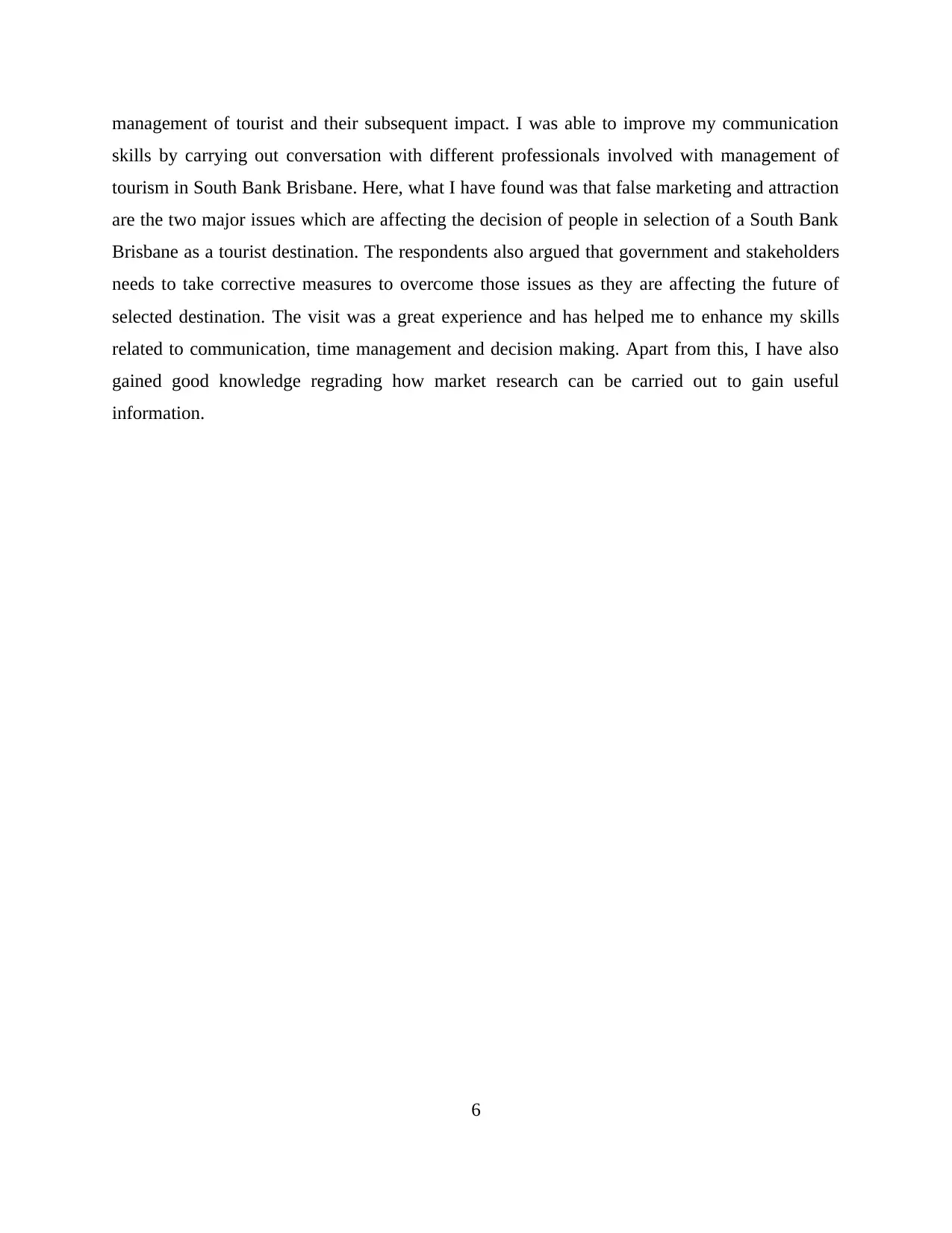
management of tourist and their subsequent impact. I was able to improve my communication
skills by carrying out conversation with different professionals involved with management of
tourism in South Bank Brisbane. Here, what I have found was that false marketing and attraction
are the two major issues which are affecting the decision of people in selection of a South Bank
Brisbane as a tourist destination. The respondents also argued that government and stakeholders
needs to take corrective measures to overcome those issues as they are affecting the future of
selected destination. The visit was a great experience and has helped me to enhance my skills
related to communication, time management and decision making. Apart from this, I have also
gained good knowledge regrading how market research can be carried out to gain useful
information.
6
skills by carrying out conversation with different professionals involved with management of
tourism in South Bank Brisbane. Here, what I have found was that false marketing and attraction
are the two major issues which are affecting the decision of people in selection of a South Bank
Brisbane as a tourist destination. The respondents also argued that government and stakeholders
needs to take corrective measures to overcome those issues as they are affecting the future of
selected destination. The visit was a great experience and has helped me to enhance my skills
related to communication, time management and decision making. Apart from this, I have also
gained good knowledge regrading how market research can be carried out to gain useful
information.
6
⊘ This is a preview!⊘
Do you want full access?
Subscribe today to unlock all pages.

Trusted by 1+ million students worldwide
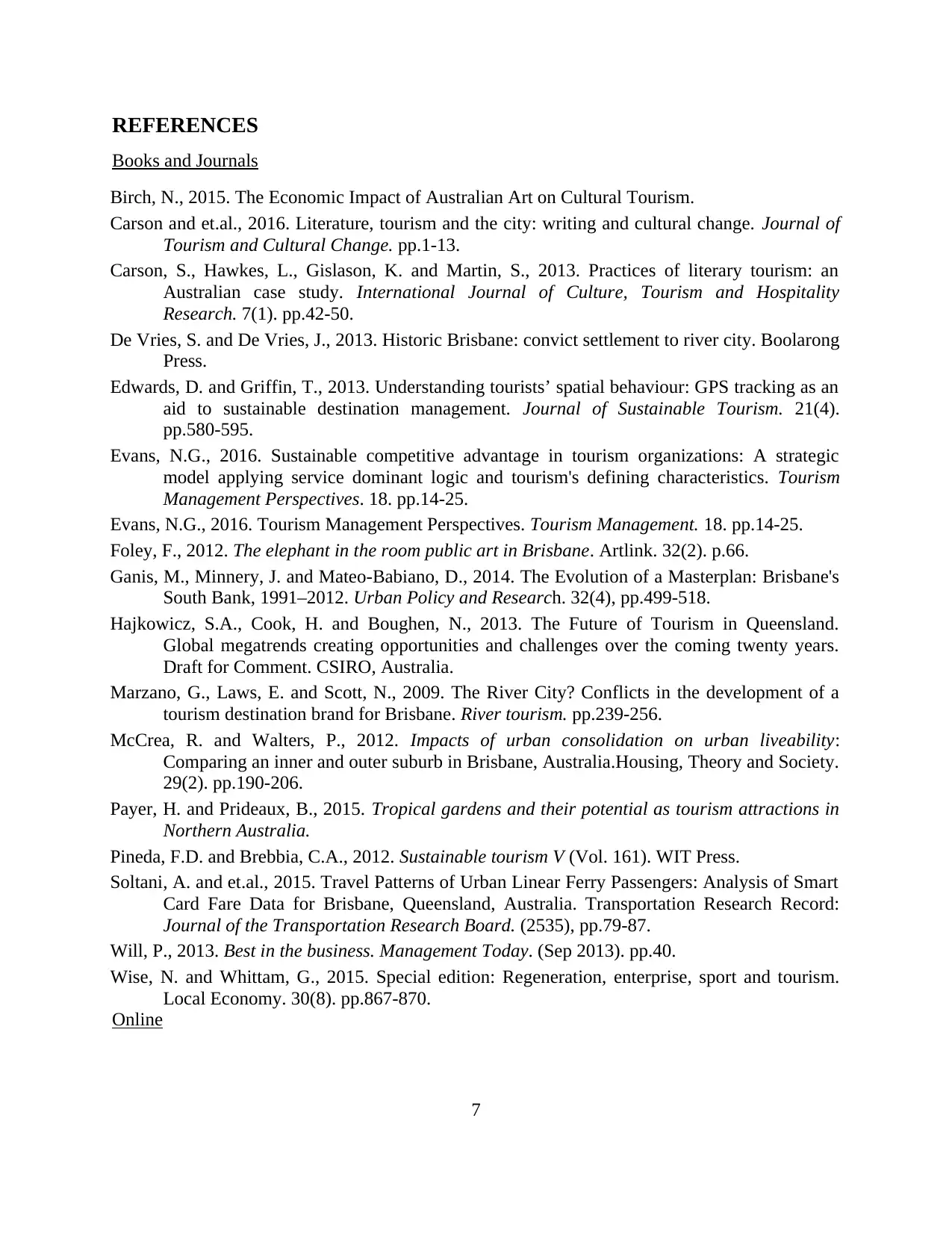
REFERENCES
Books and Journals
Birch, N., 2015. The Economic Impact of Australian Art on Cultural Tourism.
Carson and et.al., 2016. Literature, tourism and the city: writing and cultural change. Journal of
Tourism and Cultural Change. pp.1-13.
Carson, S., Hawkes, L., Gislason, K. and Martin, S., 2013. Practices of literary tourism: an
Australian case study. International Journal of Culture, Tourism and Hospitality
Research. 7(1). pp.42-50.
De Vries, S. and De Vries, J., 2013. Historic Brisbane: convict settlement to river city. Boolarong
Press.
Edwards, D. and Griffin, T., 2013. Understanding tourists’ spatial behaviour: GPS tracking as an
aid to sustainable destination management. Journal of Sustainable Tourism. 21(4).
pp.580-595.
Evans, N.G., 2016. Sustainable competitive advantage in tourism organizations: A strategic
model applying service dominant logic and tourism's defining characteristics. Tourism
Management Perspectives. 18. pp.14-25.
Evans, N.G., 2016. Tourism Management Perspectives. Tourism Management. 18. pp.14-25.
Foley, F., 2012. The elephant in the room public art in Brisbane. Artlink. 32(2). p.66.
Ganis, M., Minnery, J. and Mateo-Babiano, D., 2014. The Evolution of a Masterplan: Brisbane's
South Bank, 1991–2012. Urban Policy and Research. 32(4), pp.499-518.
Hajkowicz, S.A., Cook, H. and Boughen, N., 2013. The Future of Tourism in Queensland.
Global megatrends creating opportunities and challenges over the coming twenty years.
Draft for Comment. CSIRO, Australia.
Marzano, G., Laws, E. and Scott, N., 2009. The River City? Conflicts in the development of a
tourism destination brand for Brisbane. River tourism. pp.239-256.
McCrea, R. and Walters, P., 2012. Impacts of urban consolidation on urban liveability:
Comparing an inner and outer suburb in Brisbane, Australia.Housing, Theory and Society.
29(2). pp.190-206.
Payer, H. and Prideaux, B., 2015. Tropical gardens and their potential as tourism attractions in
Northern Australia.
Pineda, F.D. and Brebbia, C.A., 2012. Sustainable tourism V (Vol. 161). WIT Press.
Soltani, A. and et.al., 2015. Travel Patterns of Urban Linear Ferry Passengers: Analysis of Smart
Card Fare Data for Brisbane, Queensland, Australia. Transportation Research Record:
Journal of the Transportation Research Board. (2535), pp.79-87.
Will, P., 2013. Best in the business. Management Today. (Sep 2013). pp.40.
Wise, N. and Whittam, G., 2015. Special edition: Regeneration, enterprise, sport and tourism.
Local Economy. 30(8). pp.867-870.
Online
7
Books and Journals
Birch, N., 2015. The Economic Impact of Australian Art on Cultural Tourism.
Carson and et.al., 2016. Literature, tourism and the city: writing and cultural change. Journal of
Tourism and Cultural Change. pp.1-13.
Carson, S., Hawkes, L., Gislason, K. and Martin, S., 2013. Practices of literary tourism: an
Australian case study. International Journal of Culture, Tourism and Hospitality
Research. 7(1). pp.42-50.
De Vries, S. and De Vries, J., 2013. Historic Brisbane: convict settlement to river city. Boolarong
Press.
Edwards, D. and Griffin, T., 2013. Understanding tourists’ spatial behaviour: GPS tracking as an
aid to sustainable destination management. Journal of Sustainable Tourism. 21(4).
pp.580-595.
Evans, N.G., 2016. Sustainable competitive advantage in tourism organizations: A strategic
model applying service dominant logic and tourism's defining characteristics. Tourism
Management Perspectives. 18. pp.14-25.
Evans, N.G., 2016. Tourism Management Perspectives. Tourism Management. 18. pp.14-25.
Foley, F., 2012. The elephant in the room public art in Brisbane. Artlink. 32(2). p.66.
Ganis, M., Minnery, J. and Mateo-Babiano, D., 2014. The Evolution of a Masterplan: Brisbane's
South Bank, 1991–2012. Urban Policy and Research. 32(4), pp.499-518.
Hajkowicz, S.A., Cook, H. and Boughen, N., 2013. The Future of Tourism in Queensland.
Global megatrends creating opportunities and challenges over the coming twenty years.
Draft for Comment. CSIRO, Australia.
Marzano, G., Laws, E. and Scott, N., 2009. The River City? Conflicts in the development of a
tourism destination brand for Brisbane. River tourism. pp.239-256.
McCrea, R. and Walters, P., 2012. Impacts of urban consolidation on urban liveability:
Comparing an inner and outer suburb in Brisbane, Australia.Housing, Theory and Society.
29(2). pp.190-206.
Payer, H. and Prideaux, B., 2015. Tropical gardens and their potential as tourism attractions in
Northern Australia.
Pineda, F.D. and Brebbia, C.A., 2012. Sustainable tourism V (Vol. 161). WIT Press.
Soltani, A. and et.al., 2015. Travel Patterns of Urban Linear Ferry Passengers: Analysis of Smart
Card Fare Data for Brisbane, Queensland, Australia. Transportation Research Record:
Journal of the Transportation Research Board. (2535), pp.79-87.
Will, P., 2013. Best in the business. Management Today. (Sep 2013). pp.40.
Wise, N. and Whittam, G., 2015. Special edition: Regeneration, enterprise, sport and tourism.
Local Economy. 30(8). pp.867-870.
Online
7
Paraphrase This Document
Need a fresh take? Get an instant paraphrase of this document with our AI Paraphraser
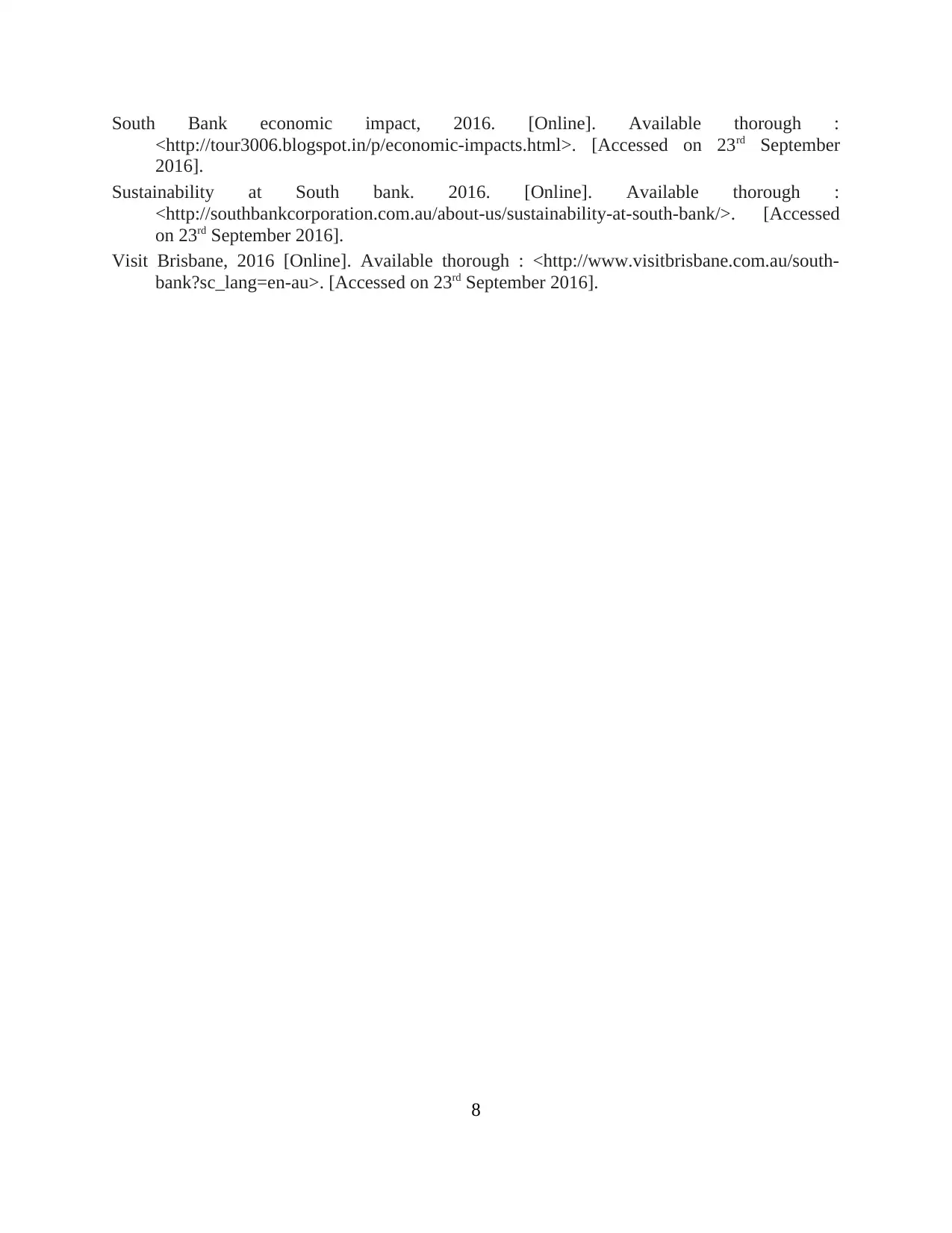
South Bank economic impact, 2016. [Online]. Available thorough :
<http://tour3006.blogspot.in/p/economic-impacts.html>. [Accessed on 23rd September
2016].
Sustainability at South bank. 2016. [Online]. Available thorough :
<http://southbankcorporation.com.au/about-us/sustainability-at-south-bank/>. [Accessed
on 23rd September 2016].
Visit Brisbane, 2016 [Online]. Available thorough : <http://www.visitbrisbane.com.au/south-
bank?sc_lang=en-au>. [Accessed on 23rd September 2016].
8
<http://tour3006.blogspot.in/p/economic-impacts.html>. [Accessed on 23rd September
2016].
Sustainability at South bank. 2016. [Online]. Available thorough :
<http://southbankcorporation.com.au/about-us/sustainability-at-south-bank/>. [Accessed
on 23rd September 2016].
Visit Brisbane, 2016 [Online]. Available thorough : <http://www.visitbrisbane.com.au/south-
bank?sc_lang=en-au>. [Accessed on 23rd September 2016].
8
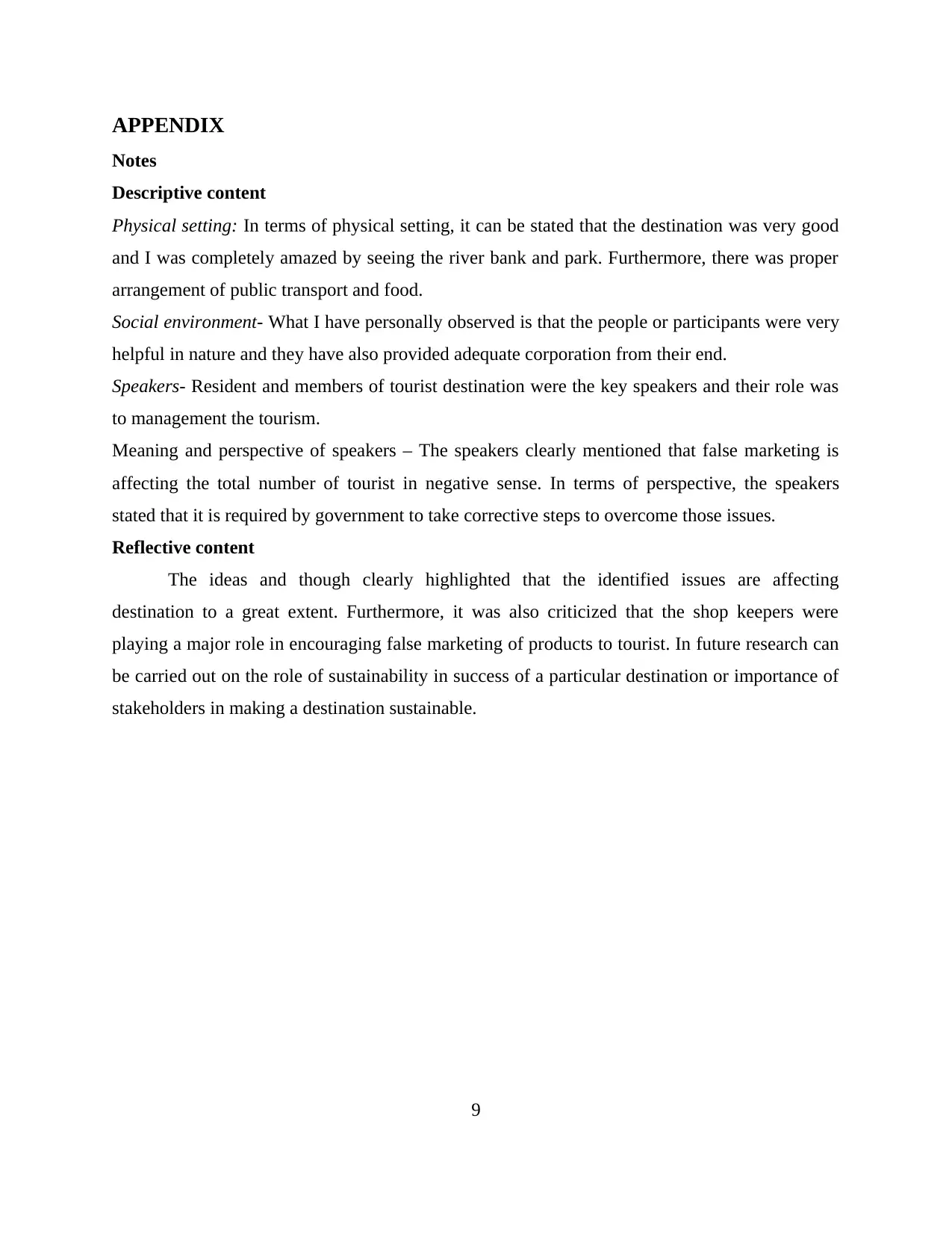
APPENDIX
Notes
Descriptive content
Physical setting: In terms of physical setting, it can be stated that the destination was very good
and I was completely amazed by seeing the river bank and park. Furthermore, there was proper
arrangement of public transport and food.
Social environment- What I have personally observed is that the people or participants were very
helpful in nature and they have also provided adequate corporation from their end.
Speakers- Resident and members of tourist destination were the key speakers and their role was
to management the tourism.
Meaning and perspective of speakers – The speakers clearly mentioned that false marketing is
affecting the total number of tourist in negative sense. In terms of perspective, the speakers
stated that it is required by government to take corrective steps to overcome those issues.
Reflective content
The ideas and though clearly highlighted that the identified issues are affecting
destination to a great extent. Furthermore, it was also criticized that the shop keepers were
playing a major role in encouraging false marketing of products to tourist. In future research can
be carried out on the role of sustainability in success of a particular destination or importance of
stakeholders in making a destination sustainable.
9
Notes
Descriptive content
Physical setting: In terms of physical setting, it can be stated that the destination was very good
and I was completely amazed by seeing the river bank and park. Furthermore, there was proper
arrangement of public transport and food.
Social environment- What I have personally observed is that the people or participants were very
helpful in nature and they have also provided adequate corporation from their end.
Speakers- Resident and members of tourist destination were the key speakers and their role was
to management the tourism.
Meaning and perspective of speakers – The speakers clearly mentioned that false marketing is
affecting the total number of tourist in negative sense. In terms of perspective, the speakers
stated that it is required by government to take corrective steps to overcome those issues.
Reflective content
The ideas and though clearly highlighted that the identified issues are affecting
destination to a great extent. Furthermore, it was also criticized that the shop keepers were
playing a major role in encouraging false marketing of products to tourist. In future research can
be carried out on the role of sustainability in success of a particular destination or importance of
stakeholders in making a destination sustainable.
9
⊘ This is a preview!⊘
Do you want full access?
Subscribe today to unlock all pages.

Trusted by 1+ million students worldwide
1 out of 9
Related Documents
Your All-in-One AI-Powered Toolkit for Academic Success.
+13062052269
info@desklib.com
Available 24*7 on WhatsApp / Email
![[object Object]](/_next/static/media/star-bottom.7253800d.svg)
Unlock your academic potential
Copyright © 2020–2026 A2Z Services. All Rights Reserved. Developed and managed by ZUCOL.





